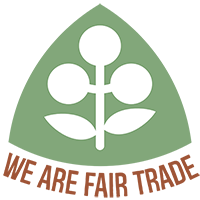LAST ORDERING DATES FOR CHRISTMAS DELIVERY:
Tracked 48 - 17th December, Tracked 24 18th December
LAST ORDERING DATES FOR CHRISTMAS DELIVERY:
Tracked 48 - 17th December, Tracked 24 18th December
Product Finder
- Alara
- Bethlehem Baubles
- Bio D
- Black Mamba
- Café Direct
- Cocoa Loco
- Divine
- Earth Squared
- Ethiqana
- Equal Exchange
- Fair To Trade
- Fernweh Clay Designs
- Island Bakery
- Made In Africa Chocolate
- Namaste
- Pachamama Knitware
- Planet Wrap It
- Rounton Coffee Roasters/We Are Fair Trade
- Shared Earth
- Steenbergs
- Storm Tea
- Suma Wholefoods
- Sunshine Nut Company
- Thought
- Threads Of Life
- Tony's Chocolonely
- Traidcraft
- We Are Fair Trade
- Whitakers
- Wrappily
- Zaytoun





- Alara
- Bethlehem Baubles
- Bio D
- Black Mamba
- Café Direct
- Cocoa Loco
- Divine
- Earth Squared
- Ethiqana
- Equal Exchange
- Fair To Trade
- Fernweh Clay Designs
- Island Bakery
- Made In Africa Chocolate
- Namaste
- Pachamama Knitware
- Planet Wrap It
- Rounton Coffee Roasters/We Are Fair Trade
- Shared Earth
- Steenbergs
- Storm Tea
- Suma Wholefoods
- Sunshine Nut Company
- Thought
- Threads Of Life
- Tony's Chocolonely
- Traidcraft
- We Are Fair Trade
- Whitakers
- Wrappily
- Zaytoun
Gift Finder
Add description, images, menus and links to your mega menu
A column with no settings can be used as a spacer
Link to your collections, sales and even external links
Add up to five columns
Add description, images, menus and links to your mega menu
A column with no settings can be used as a spacer
Link to your collections, sales and even external links
Add up to five columns
Climate Change Is The Reality For Fair Trade Farmers And Their Communities.
January 30, 2024 2 min read

Up to 70% of the world’s food is produced by smallholders and climate change is a daily reality for many of these producers in the Global South and developing world. It is these rural communities that are most vulnerable to the affects of climate change, but who have contributed to it the least.
‘There is a chain on earth that starts at the bottom where the producers are. They are the ones who suffer the consequences of climate change, the ones who get the least help, and carry all of the burden. It’s not fair.’ – BAYARDO BETANCO, PRODECOOP FAIRTRADE™ COFFEE COOPERATIVE, NICARAGUA
How Fair Trade is working to address climate change.
- Fairtrade standards cover vital areas of environmental protection, such as improving soil and water quality, avoiding harmful chemicals and protecting biodiversity.
- Being part of Fairtrade means farmers are given technical support to build skills and knowledge. They have access to training to build awareness of environmental issues and how these impact their lives and crops.
- By following Fairtrade standards farmers improve their land, developing rich soils to support healthy plants and encouraging wildlife to help control pests and diseases.
- Farmers are offered the opportunity to generate Fairtrade Carbon Credits via the Fairtrade Climate Standard, which enable farmers to access carbon finance to help tackle climate change effects.
- For every carbon credit sold the also receive the Fairtrade Premium, to invest further in climate adaptation.
- Fairtrade supports and incentivises nature friendly farming, moving toward resilient farming methods and applying climate change adaption plans.
How Fair Trade is actioning positive change to help disadvantaged producers and farmers.
- A dynamic agroforestry project was established with the Kuapa Kukoo cocoa farmers’ cooperative in Ghana.
- By combining crops and tree species, of different life cycles the farmers now have year-round additional crops for their own use or to sell on the local market. It also means they have additional income outside of the cocoa growing season.
- Food crops, tree crops and other plants all come together to improve soil, provide shade and add to biodiversity.
- The project aims to have 400 farmers, each working 1 hectare of land using agroforestry methods, by 2025.
- Extreme weather patterns such as hurricanes, increased temperatures and floods are effecting countries in Central America and the Caribbean and pests and diseases are spreading their way through these countries.
- Banana growers in Colombia are being provided with ways to manage plant diseases, reduce water consumption and improve fruit using bio-fertilisers.
- Bananas are susceptible to soil borne fungus which gets into the roots of the plant and effects the way in takes in water and black rust which is caused by insects.
- The Productivity Improvement Programme, PIP, is a Fairtrade initiative and through this the growers have saved money, used less water and improved the condition of the soil.
See all our Fairtrade and Fairly-Traded products here





